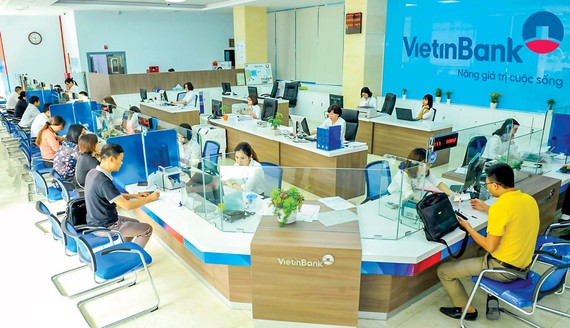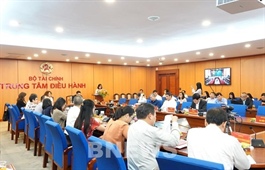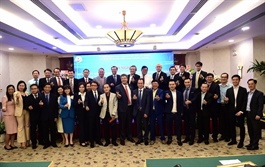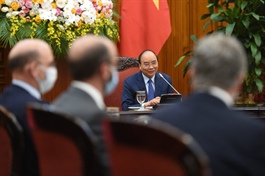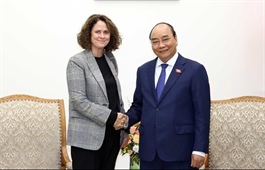Banks elated with new Government Decree
Banks elated with new Government Decree
State capital investment can now expand into joint stock companies or two or more member limited liability companies, as per a new Decree 121/2020 issued by the Government, which was amended to supplement Clause 2 of Article 12 in Decree 91/2015 dated 13 October 2015, on investment, management and use of capital and assets in enterprises. This is good news for banks in the Big 4 group.
Illustrative photo.
|
Bottleneck removed
VietinBank has just announced a plan to increase charter capital by issuing shares to pay dividends from profit-after-tax and deduction of funds in last three years from 2017 until 2019. The bank released this announcement soon after the Government issued Decree 121/2020, showing the banks urgent need to increase capital, because charter capital in VietinBank has been static since 2014.
In 2016, when the need to increase capital was very urgent, VietinBank decided not to pay the 2015 dividend. BIDV also chose to pay dividends in shares at the rate of 8.5%. This was decided and approved at the AGM and banks were allowed to increase their capital to improve the capital adequacy ratio (CAR). However, the Ministry of Finance then sent a written request to the State Bank of Vietnam to direct the representatives at BIDV and VietinBank to clear dividend payment of fiscal year 2015 in cash only, and give back all dividends toward the state budget. Both the banks had to subsequently change their plans and pay dividends in cash.
However, VietinBank continued to petition the Government, the State Bank of Vietnam and other related ministries and agencies to allow profits to be retained, or pay dividends in shares, so as to increase capital. Another reason why VietinBank persisted was due to the regulation that percentage of state ownership in joint stock commercial banks with state capital must not be lower than 65%, and ownership of foreign investors at a maximum of 30%. However, in 2016, state ownership in Vietcombank was 77.1%, at BIDV it was 95.8%, at Agribank it was 100%, while VietinBank was only at 64.46%. The ownership ratio of foreign shareholders and strategic shareholders in VietinBank was also close to maximum. This meant that VietinBank had no room to raise capital through additional issuance to foreign investors.
Meanwhile, with more space in 2019, Vietcombank could sell shares to foreign investors, such as the Government of Singapore (GIC) and Mizuho, with a total sale value of about USD 270 mn, which helped to increase charter capital to VND 37,000 bn. BIDV also issued 603.3 mn shares to KEB Hana Bank privately, with a total transaction value of nearly VND 20,300 bn. After the issuance, BIDV charter capital increased from VND 34,187 bn to VND 40,220 bn, the highest in the Vietnam banking system.
Banks receive push
Under Decree 121/2020, not only VietinBank but also BIDV and Vietcombank can breathe a sigh of relief. However, although there is more room now, the sale of state capital to a foreign strategic partner is not easy. For example, before completing the capital sale deal to GIC and Mizuho in 2019, the 2017 agreement between Vietcombank and GIC was not successful because when selling capital at the request of the Government, the capital reduction and divestment must satisfy certain conditions, including asking price not being lower than market price, which process takes a long time.
In a report released at the end of 2017, the National Financial Supervisory Commission said that the CAR in commercial banks with state capital had approached 9%, and when applying for Basel II, CAR would drop below 8%. The Commission has built a model to forecast the need for additional equity each year for three banks, Vietinbank, BIDV and Vietcombank, to estimate capital needs in the period between 2018 to 2020. The model is built on certain assumptions (i) that the asset growth rate is about 14-18% per year, (ii) meets CAR ratio of 8%, (iii) BASEL II ratio of risk assets/total assets is about 65-95%. As a result, by the end of 2020, due to the huge increase in equity demand, banks must increase their equity capital by 1.8 to 2 times more to meet Basel II standards. Based on this calculation, the demand for capital increase at BIDV and Vietcombank is still very huge.
At the shareholders meeting this year, Vietcombank is expected to continue to increase its capital to around VND 43,000 bn. The plan is to issue shares to pay dividends to shareholders in 2018 at the rate of 18%, while the realized capital will be taken from retained earnings until the end of 2018. At the same time, the bank will issue up to 241 million individual shares, equivalent to 6.5% of charter capital for upto 99 investors, with some being existing shareholders. BIDV is submitting to shareholders a plan to increase charter capital from VND 40,220 bn to VND 45,549 bn in 2020, by issuing 281.5 million shares to pay dividends at the rate of 7%.
Thus, equity capital in banks will continue to increase. At the same time, if a bank is listed but the State holds majority, the market will hold 5% to 10%, so it will be difficult to reach the target by 2025, even though Vietnam can now claim that two or three of its banks can be placed on list of top 100 banks in Asia.


